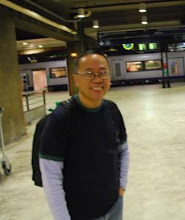SEEK YE FIRST THE KINGDOM OF GOD. Clark's Chapel One, as it looked in 1959. Just recently finished that year, the modern church featured amenities such as air conditioning for churchgoers'' comfort and convenience. The church as remained the same, unlike Chapel Two which was heavily restored post-Pinatubo.
By the late 50s, Clark Field was a modern, bustling and fully equipped air base, the nerve center of U.S. Air Force operations in Southeast Asia. The “biggest air base in the world” was home to thousands of servicemen from the Thirteenth Air Force and their families. Here, they converged as a community, from all parts of America, of diverse backgrounds and interests--and with different religious beliefs.
For the varied spiritual activities, three base chapels and a religious center staffed with 8 chaplains of different faiths, were ready to offer varied religious programs to all Clark Air Base personnel. The chapels were the designated venues for the daily and weekly activities of major religious groups. As such, there were regularly-held Protestant Sunday Services, Sunday School, General Worship Service, Episcopal Service, Latter Day Saints Sunday School, Christian Science Service, Protestant Evening Fellowship and Evangelistic Service.
Two notable churches were operational by 1959. Church 1 was the newest, built on sprawling grounds near the corner of Dyeess Highway. The church had a modern, sleek design and even had air-conditioning for the churchgoers’comfort and convenience. On the other hand, Chapel Two, with its trademark spire, stood along Marrat Highway, across Kelly Restaurant and right next to the Gymnasium.
The churches and the religious staff observed a hectic schedule, what with weekly services that include Midweek Fellowship, Episcopal Communion and Bible Study. Seven times on Sunday, Catholic Sunday masses were celebrated. On regular days, masses were said twice daily. Also conducted weekly were evening devotions, and novenas.
Religious organizations included the well-attended Sunday schools operated by the Protestant chaplains on an inter-denominational basis. They sponsored a daily vacation Bible School, a Junior and Senior Choir, Youth Fellowship, Retreats, Bible Classes and frequent social events.
On the other hand, Roman Catholic chaplains organized religious groups like the Holy Name Society, Ladies’ Sodality, Legion of Mary, with well-rounded programs that included holding Holy Name Retreats, missions, novenas, choir and religious instruction classes.
Special Jewish services conducted by their chaplains include: Chanukah, Purim, Passover and Shavvoth.
Baptism, confirmation, weddings and other religious ceremonies could also be arranged by contacting the chaplain of one’s respective faith.
Today, the churches of







No comments:
Post a Comment